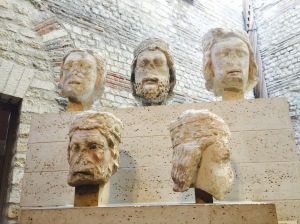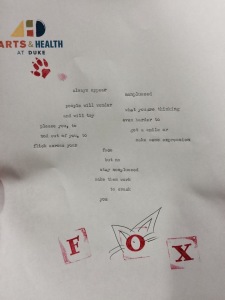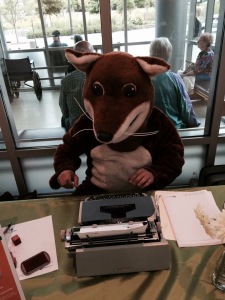Like a school of fish or a pride of lions or a murder of crows, that’s what a group of elephants is called: a memory.
Nothing thunderous in that phrase—nothing like what is suggested by a herd of elephants or a parade of elephants. More like elephants drinking from a low lake at sunrise. Or a spot where elephants used to be drinking, but are no longer. Something enormous and consuming and ethereal.
Not unlike anesthesia, really, which—as the absence of all sensation—leaves you with incisions and deep aches and crisp bandages you cannot empirically account for and are therefore compelled to make sense of by conjuring a collection of massive and unshakable dreamlike certainties.
Surgery was smooth—and far less scary than I thought it would be. My parents were able to slip upstairs after my mom’s appointment with Dr. Gasparetto to see me off into the Land of La La—I was so relieved to see them before the world went spinning.
And John was right there with me when I woke up—and when I fell back asleep—and woke up again—and conked out again. He calmly held my hand, smiled at my dopiness, and made fun of me on social media, all while sounds of the Pirates playing an evening game on some distant TV in some distant universe seemed to sift like light through the hospital blinds as I came back to the world.
And then there was Dr. Georgiade peering down at me, talking about what an excellent job he had done (surgeons!) and telling me my nodes looked negative and making jokes I could hardly follow even though I’m pretty sure they were the same jokes he’d been making before surgery.
And all the time I knew the boys were safe at home conning their Nana into giving them soda and financing their arcade addictions.
The whole thing was pretty blissful. I’ve been lucky to have no complications or even much pain so far—that lonely little bottle of oxy on my dresser is just sitting there going to waste.
But on the subject of elephants, there is an elephant in the (recovery) room: I am missing a breast.
There are in fact several elephants—or a memory of elephants—in the room. There is the cancer elephant, taking up a lot of space but not exactly in the same menacing way it was before. And my mom’s elephant, that unpredictable beast, which shrinks and grows, sometimes looking familiar, but other times so strange and coarse I think it is actually a rhinoceros—part of a crash of rhinos, or a stubbornness of rhinos.
(Who comes up with these collective animal names? A gaze of raccoons. A rhumba of rattlesnakes. A float of crocodiles. A rafter of turkeys. An exaltation of skylarks. A business of ferrets. It’s as though some free-associating poet posed as a biologist for the world’s best homework assignment.)
Then this newest elephant: I have one breast. The other side is something I don’t really know yet—I haven’t seen under the bandage. It’s not gory or bruised or swollen (the surgeon did, in fact, do a great job, it seems). But I don’t know what it is. It looks flat, almost concave—like a lake bed where a memory of elephants once drank. It is an absence, a memory itself.
I sense that my emotions around it are waiting as if on a shelf just out of reach. Right now the focus feels so physical, almost geographical. The drain in my chest, the sore armpit, the way my shirts now drape on one side as if on a clothesline.
But there are all the other things, too—the obliterated sense of femininity, the skewing of self, the neither-here-nor-there-ness of the body. I don’t really understand that part yet. I guess that’s why this fact is the most elephantine of the elephants in the room for me right now. It’s definitely there, but I don’t know what exactly to say about it yet.
So right now I have my eye on those dreamlike certainties: a cure of doctors will examine me tomorrow at Duke, and in the meantime a cauldron of thunderstorms simmers on the horizon and an anticipation of cocktails awaits some ice.



 attling, the fighting/surviving, the winning/losing, the “beating this”-ing, but I think I’m good with not letting it crack me. I
attling, the fighting/surviving, the winning/losing, the “beating this”-ing, but I think I’m good with not letting it crack me. I